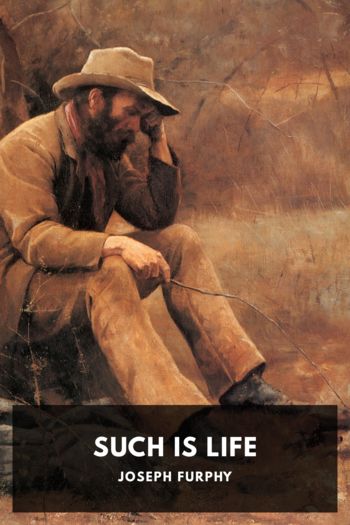Such Is Life - Joseph Furphy (philippa perry book txt) 📗

- Author: Joseph Furphy
Book online «Such Is Life - Joseph Furphy (philippa perry book txt) 📗». Author Joseph Furphy
“Hold on, Moriarty,” I interrupted, recalling myself. “Let’s hear that fifty-to-one offer again. Am I to understand that if Toby has letters for the station and none for me, you win; if he has letters for me and none for the station, I win; and, failing the fulfilment of either double, the wager is off?”
“That’s it. Are you on?”
“Make it a hundred to one.”
“Done! at a hundred to one—in what?”
“Half-sovereigns,” I replied, feeling for the purse which, vulgar as it is, bushmen even of aristocratic lineage are compelled to carry. I placed the little coin—about one-tenth of my total wealth—in Moriarty’s hand. He shrank from the touch.
“What do you mean?” he asked petulantly. “I mightn’t win it, after all. Don’t be more disagreeable than you can help.”
“You intend to get it without giving an equivalent—don’t you? You know it’s yours. Aren’t you betting on a certainty? Lay it on the windowsill, if you like, and pick it up when you can read your title clear. If you don’t speculate, you won’t accumulate; and I suppose you’ve no objection to looking into the morality of your speculation—”
I had cleared my throat for a disquisition which would have been intolerable to the unprincipled reader, when a very curious thing arrested the attention both of Moriarty and myself—the strangest coincidence, perhaps, within the personal experience of either of us—a conjuncture, in fact, which for a moment threw us both staggering back on the theology of childhood. At the present time, I feel too meek to attempt any unravelment, and too haughty to offer any apology other than that such is life.
The half-caste had cantered up to the horse-paddock gate, had dismounted, had divested his horse of the saddle and bridle, and had given the animal a slap with the latter. Now he was depositing those equipments in the shed. Now he approached us, taking two letters and a newspaper from the tail-pocket of what had once been an expensive dress-coat of Montgomery’s.
“Yours, Collins,” said he. “Don’t say I never gave you nothing. Nix for you, Mr. (adj.) Moriarty.”
“You’re very laconic,” observed the storekeeper in a hollow voice, yet eyeing the prince sternly; “very laconic, indeed, I must say. If I was you, I wouldn’t be quite so laconic. How the (sheol) comes it that you didn’t fetch the mail?”
“Needn’t look in that paper for the Flemington, Collins,” said the heir-apparent; “she’s a day too soon. I took a squint at her, comin’ along.”
“I was asking how the (adj. sheol) you managed to come without the mail?” repeated Moriarty, with dignity.
“I heard you, right enough. I ain’t deaf. Well, I come on a moke. Think I padded it? Fact was, Moriarty, I met Magomery at Bailey’s Tank, an’ he told me to go like blazes to Scandalous Sandy’s hut, on Nalrooka, an’ tell him a lot o’ his sheep was boxed with ours in the Boree Paddick. ‘I’ll fetch the mail home myself,’ says he. There now.”
“And why didn’t you go to Scandalous Sandy’s?” nagged Moriarty.
“Well, considerin’ you’re boss o’ this station, an’ my bit o’ filthy lucre comes out o’ your pocket, I got great pleasure informin’ you I met ole Gladstone, comin’ to tell us the same yarn. Anything else you want to know?”
“Did you hear which crew won the regatta?” asked Moriarty, almost civilly.
“Sydney,” replied the prince. “Think you Port Phillipers could lick us?”
“That’s a lie!” exclaimed Moriarty, catching his breath.
“Right. It’s a lie, if you like. I got no stuff on it. See what Collins’ paper says. An’ now I feel like as if I could do a bit o’ dinner—unless you got any objections?”
He stalked away toward the hut, whilst I opened what turned out to be a love-letter—evidently intended for some other member of our diffusive clan, for I could make neither head nor tail of it; nothing, indeed, but heart, and such heart as it has never been my luck to capture. Meanwhile, Moriarty had cut the string of the newspaper, and was running his eye over its columns.
“My mozzle is out, Collins.” said he, with an effort. “I’ll never clear myself—never in the creation of cats. It’s all up!”
“Yes; you suffer by comparison with the sanctimonious old hypocrites now,” I replied, in a fatherly tone, as I took the half-sovereign from the windowsill. “Feel something like an overproof idiot—don’t you? We’ll talk about that presently. But see what I’ve got here.”
My second letter ran:—
K3769 No. 256473 Central Office of Unconsidered Trifles, Sydney, February 1, 1884.
Mr. T. Collins.
Sir—I am directed to inform you that the Deputy-Commissioner purposes visiting Nyngan on the I7th prox. You are required to attend the Office of the Department in that township at 11 a.m. on the day above mentioned, to furnish any information which he may require.
I am, Sir
Ynnnnnnnnnnly
MMMnnynnlnny
pro Assistant-Under-Secretary.
“Not a whisper about the M-form,” I remarked. “Perhaps it’s in your mail. No odds. Montgomery can complete it, and send it on, just as well as if I hadn’t been near the place at all. But here’s something like two hundred and thirty miles to be done in seven days—and the country in such a state. This is the balsam that the usuring senate pours into captains’ wounds. Never mind. The time is only too near, when I’ll sit in my sumptuous office, retaliating all this on some future Deputy-Assistant-Sub-Inspector. And, in the meantime, this long dusty ride will make a man of me once more.





Comments (0)